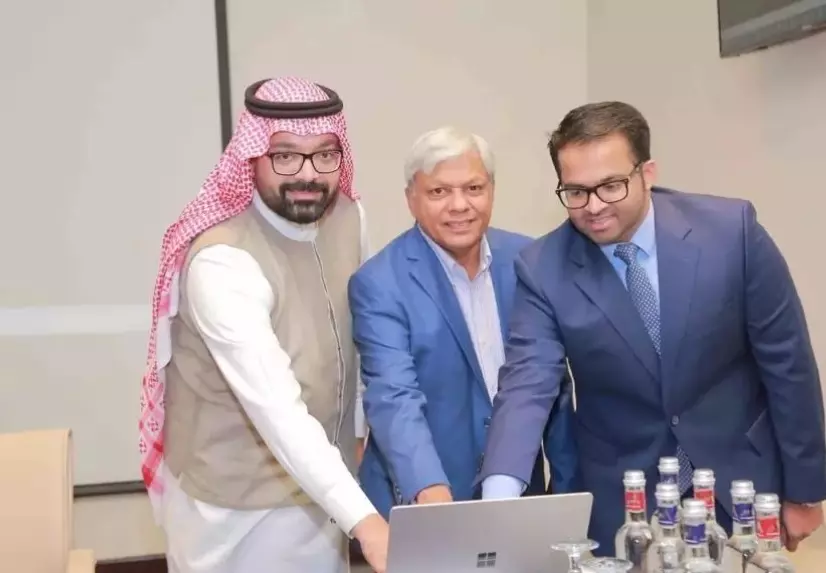
Reliving the nostalgia: new Saudi Malayalam radio brings back RAK radio memories
text_fieldsCluster Arabia's CEO Raheem Pattar Kadavan announces Capital Radio Network's launch at Jeddah's Park Hyatt Hotel on March 22
As Saudi Arabia gears up to launch Malayalam radio programs in July 2023, the news has stirred up my memories of a similar milestone from over three decades ago. The year was 1992, and the Middle East was abuzz with the introduction of the first-ever Malayalam radio programs from Ras Al Khaimah in the United Arab Emirates. The nostalgia is palpable as we take a trip down memory lane, reflecting on how far we have come and the exciting possibilities that lie ahead.
The Saudi Arabian media ministry recently granted licences to the Saudi-based Cluster Arabia Group to operate four foreign-language FM stations. The addition of Malayalam, English, Hindi, and Tagalog radio programs is part of the Kingdom's commitment to providing its diverse expat population with more cultural and economic opportunities.
The Kingdom has always been active in the world of media promotion. In April 1999 the Gulf region witnessed the birth of its first-ever Malayalam newspaper, Malayalam News, published in the Kingdom of Saudi Arabia. I was fortunate enough to be a part of the senior team who was part of launching the newspaper. Prior to this, the Kingdom had launched an Urdu newspaper named Urdu News in 1994. This groundbreaking step laid the foundation for numerous Malayalam newspapers to be reprinted in different Gulf countries.
While the Kingdom pioneered the first-ever Malayalam newspaper from the Middle East, it was the United Arab Emirates that broke new ground by being the first Gulf country to air Malayalam radio programs. And the credit of embracing this novel concept went to Ras Al Khaimah.
The first Malayalam radio from the Gulf
Ras Al Khaimah Radio was launched on May 9th, 1992. It was the culmination of a two-year-long tireless effort by my friend Basheer Abdulla and myself. This one-hour-long program was packed with information, entertainment, music, drama, celebrity interviews, and news catering to the half-million-strong Keralite community in the UAE at that time.
We faced numerous challenges in the days of the program's inception, an era before the onset of mobile phones and the Internet. It was no mean feat to gather news and information from Kerala, while Indian newspapers reached the region only by the second day. Nonetheless, we persevered and delivered our innovative radio programming to our keen listeners, despite some quarters deriding the very concept of a radio program in the Gulf.
From the moment it hit the airwaves, Ras Al Khaimah Radio was embraced by expats who found comfort and familiarity in the voices of the presenters who became their household names. The show's popularity was such that it prompted letters of gratitude from as far afield as Saudi Arabia.
The program was later acquired by the Dolphin Group and renamed Radio Asia, and gradually the Malayalam language program expanded from its initial one-hour format to a 24-hour service within a span of just seven years. The foreign language landscape of the UAE expanded so much so that at its zenith, a staggering 11 radio stations in the UAE were broadcasting in Malayalam, providing much more than a lifeline to over one million listeners who relied on the programs for up-to-date news, traffic updates, entertainment, and other vital local information.
The shifting landscape of radio listenership in the UAE
The decline of listenership in the radio industry has had a significant impact, particularly on Malayalam radio stations in the UAE. As younger generations increasingly turned to social media, online news, and streaming services for their entertainment and news, radio stations have seen a decline in revenue. This, coupled with the exorbitant licensing fees, has forced the closure of several radio stations over the past 7 years. Among those that have ceased broadcasting are Radio Mango96.2 FM, Asianet Radio 657 AM, Radio Me 100.3FM, Flowers FM 94.7, Voice of Kerala 1152 AM, and Pravasi Bharathi 810 AM - with varying length of existence.
Despite these challenges, five Malayalam radio programs, including Hit 96.7 FM, Gold 101.3 FM, Radio Asia 94.7 FM, Club 99.6 FM, and Radio Keralam 1476 AM, still operate in the UAE. Many of these stations have pivoted to digital platforms, with a strong online presence on social media platforms such as Facebook and Instagram.
The rise of app-based digital radios
Fortunately, six months ago, I was given the opportunity to advise and assemble a team to create an app-based radio for the S&Z Group in the UAE. This fully digital, app-supported radio station, known as 360 Radio, has a primary objective of facilitating better communication and understanding among people through a diverse range of educational and entertaining programs. Since this program has attracted listeners, many others with a similar format have come up, and existing radio stations have launched special apps to retain their listeners.
The Indian diaspora in the Gulf region is among the world's largest, with approximately six million Indian immigrants out of a total of 25 million worldwide. Given the deep cultural and historical ties between India and the Gulf region, as well as the influx of Indians following the oil boom, it is no surprise that there is a thriving market for radio programs in languages like Hindi, Urdu, Malayalam, Tagalog, Bengali, Pashtu, Russian, and Italian.
In short, radio programs have come to stay as an integral part of the expatriate experience, providing much-needed entertainment and connection to those who may otherwise feel disconnected from their homeland.
Exploring untapped potential of Saudi Arabia
In the vast Kingdom of Saudi Arabia, where over a third of the population comprises expatriates, Indians top the number among foreigners with a whopping 2.55 million. The Kingdom also boasts a strong social media presence, with popular platforms like YouTube, Instagram, and Facebook. YouTube reigns supreme with a staggering 29.3 million users.
Saudi Arabia is going to launch three FM stations in Malayalam, Hindi, English and Tagalog, targeting an estimated audience of six million listeners. With 2.55 million Indians, 2.45 million Pakistanis, and 1.6 million Filipinos, it's a no-brainer why these stations have been launched to cater to the masses.
However, covering the vast expanse of the country's 2.15 million sq km with only three FM stations poses a daunting challenge. Hence, probably the radio programs will initially focus on the urban population of cities like Riyadh, Jeddah, Makkah and Medina.
While Saudi Arabia may be vast, the number of radio stations is still relatively low. Therefore, there is immense potential for the growth of radio programs in the Kingdom. According to market projections, Saudi Arabia's audio advertising spending is expected to reach $30.26 million in 2023, with traditional radio advertising accounting for the largest portion of this spending, at $21.44 million.
In the coming months, radio programs will become an indispensable part of the lives of Keralite expatriates in Saudi Arabia, who account for over a million. The programs will serve as a platform to keep them informed of the latest developments in the country and homeland, including vital rules and regulations.
The Kingdom is currently experiencing significant migration, attracting people from different parts of the world to work on various projects. As part of its Vision 2030 plan, the country is focused on diversifying its population and creating to more inclusive communities that celebrate the diversity of its ethnic and linguistic groups, including those from Asia, Europe, and America.
(The writer is a UAE-based senior media person and was involved in the setting up of the Middle East's first Malayalam Radio program from Ras Al Khaimah in 1992)

















